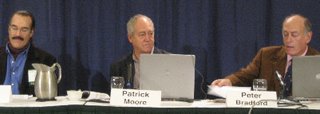 Hello from Burlington! I'm at the Society of Environmental Journalists Conference with Melanie Lyons, NEI media relations manager. This morning Patrick Moore spoke on a panel called "Cradle to Grave: New Nukes and Old Radioactive Waste," which focused largely on the safety and economic issues surrounding nuclear power. Patrick was outnumbered on this panel 2-1, as he was joined by Jim Riccio of Greenpeace and former NRC Commissioner Peter Bradford, now of the Union of Concerned Scientists and an adviser to the Grace Energy Initiative. But Patrick held his own and shared a lot of facts about nuclear energy. I'll walk you through the proceedings in case you missed the webcast by Grace Energy Initiative.
Hello from Burlington! I'm at the Society of Environmental Journalists Conference with Melanie Lyons, NEI media relations manager. This morning Patrick Moore spoke on a panel called "Cradle to Grave: New Nukes and Old Radioactive Waste," which focused largely on the safety and economic issues surrounding nuclear power. Patrick was outnumbered on this panel 2-1, as he was joined by Jim Riccio of Greenpeace and former NRC Commissioner Peter Bradford, now of the Union of Concerned Scientists and an adviser to the Grace Energy Initiative. But Patrick held his own and shared a lot of facts about nuclear energy. I'll walk you through the proceedings in case you missed the webcast by Grace Energy Initiative.Jim Riccio spoke first and painted nuclear power plants as prime targets for terrorism. From where I was sitting, it looked like he was doing a bit of fearmongering, basically saying it's only a matter of time before a plant is hit. Patrick Moore refuted this a bit later, noting that terrorists choose political targets, not industrial targets, and even if they did, nuclear plants are highly regulated and focused on safety. He later claimed that nuclear power plants have never tested their ability to sustain an attack from a commercial airline, but instead just say testing during station blackouts is for this purpose. I really don't know where he got that idea, nor the idea that a nuclear plant caused the Northeast blackout a few years back. For more background on the 2003 blackout and nuclear energy, click here.
Anyway, Dr. Moore talked a bit about his early days at Greenpeace, and why he left--choosing to spend his time being in favor of solutions to problems rather than simply protesting the problems. He made a very important point: Greenpeace is opposed to nuclear energy, as we all know. It is opposed to coal-fired plants and natural gas. And it opposes hydroelectric dams. That leaves the category of "other," which accounts for only 0.8 percent of the world's energy supply. This includes wind, solar, etc. While NEI and savvy environmentalists like Moore recognize that renewable sources of energy should be a part of the solution to climate change, we also know that they simply cannot be expanded enough to be the only solution. And Dr. Moore said repeatedly today that nuclear also is not the only solution--but it should be and will be an important part of it. So he asked how Greenpeace can possibly favor only 0.8 percent of the world's energy supply. If they are so concerned about climate change, shouldn't they be open to more likely possibilities?
Another important point Dr. Moore made: We should not ban the beneficial uses of a technology just because of its potentially dangerous uses. If we did that, we would have to ban machetes and automobiles, among other things.
On to Peter Bradford. He reiterated our own point that nuclear power is not the "magic bullet" answer to climate change. We agree. See above. Then he talked about the wedge theory (PDF), which David Bradish discussed in an earlier post this week. Basically, a wedge from renewable electricity replacing coal-based power is available from a 50-fold expansion of wind by 2054 or a 700-fold expansion of solar power. We would have to triple nuclear power's current capacity. Which even I can understand (after David explained it to me) means that nuclear requires less expansion because it can provide more energy. Bradford's take on the wedges? Nuclear can't be good because it's only one wedge, while renewables are two (solar and wind). That's just semantics.
Then the panel turned to a Q-and-A session. When asked "if no nukes, then what?" Riccio simply did not answer the question. He said the government and taxpayers would get a bigger bang for their buck of they spent it on renewables instead of nuclear, but that's as specific as he got.
Well, that's all from the SEJ conference. Melanie and I are having fun manning our booth and talking to the journalists and other exhibitors about nuclear, the clean air energy!
Technorati tags: Nuclear Energy, Nuclear Power, Electricity, Environment, Energy, Politics, Technology, Grace Energy, Greenpeace, UCS, Wind Energy, Hydropower, Solar Power, Patrick Moore, CASEnergy Coalition, SEJ
0 comments:
Post a Comment